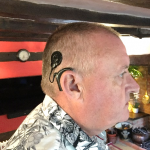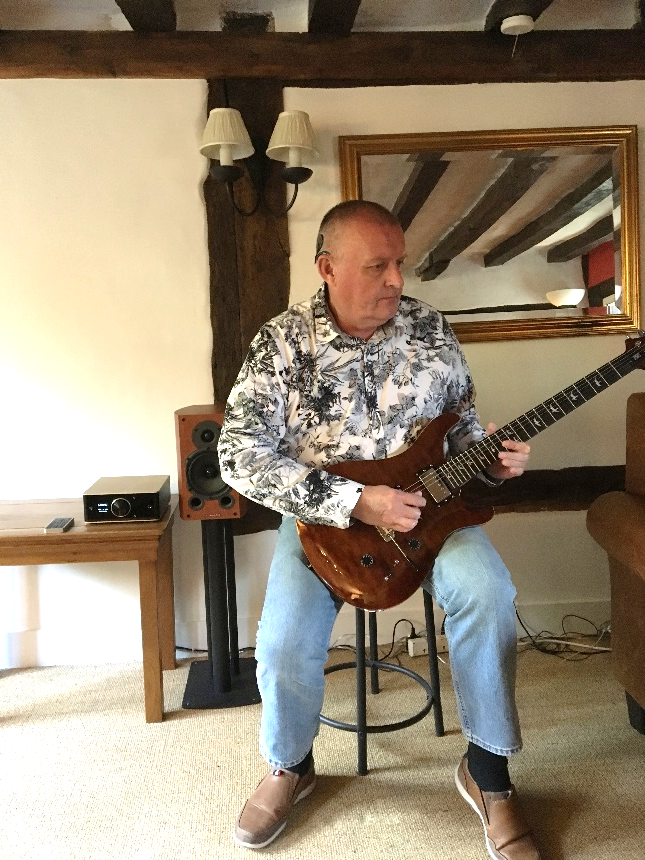A Cochlear Implant (It wasn’t meant to be this good)
It wasn’t meant to be this good. It wasn’t meant to be this precise or deliver this kind of sound quality. It wasn’t meant to be this sensitive. I am utterly astonished.
A cochlear implant is an electronic device implanted to deliver sound directly to the brain via the nerves in the cochlear. I researched cochlear implant technology extensively, including talking to users. Users describe speech as robotic (never say ‘exterminate!’ to a user) and it takes months for the brain to relearn and decipher speech. As a music lover and amateur guitar player, auditory disappointment awaits.
We had been waiting over a year.
“Are you excited about getting your cochlear implant?” Karen asks with two weeks to go before the big ‘op’.
“Not really”
“Why on earth not?”
I need to explain this well.
“I’m going through surgery to get a kind of crude squawk box attached to my head by a magnet, which may help me understand some speech, but only after about six months of trying to decipher the crazy noises it makes. I’m not going to achieve normal hearing and I am prepared for disappointment. No, not excited.
And I need surgery like I need a hole in the head.” Karen grins, but understands.
But I am not ungrateful. For a year and a half Karen has put up with my sudden onset of deafness brought about by the Flu virus. She has suffered the most, while I, often not realising, simply carry on in my own silent little world. Becoming deaf has a plethora of disadvantages, frustrations and costs. I won’t go in to them now, but expect to have difficulties with people, relationships and work, lose your social life, hobbies, plans, and aspirations. You are in virtual solitary confinement.
In the words of Pink Floyd’s Roger Waters: I have become comfortably numb.
Yes, the Flu made me deaf. You didn’t know that the flu can kill your hearing stone dead? Neither does anyone else, except my GP. No point putting a towel over your head and inhaling a bowl of steaming Vic. Get down to A&E within 48 hours for some steroid tablets and injections in the inner ear. Speed is of the essence, I left it too long, several weeks, and as expected it didn’t work. No hearing in the right ear at all, and not much in the left ear either.
Cut to the chase; the implant surgery has healed, and the big switch-on day arrives. Dr Zoe Foot checks my expectations are realistic. I explain as above. I’ve done the research. They naturally don’t want patients to feel disappointed and I want them to know I’m grateful for any benefit whatsoever, no matter how small.
I heard a beep. She was testing the implanted sensors wired through to her PC. Karen struggles with her phone trying to capture my reaction on video. I beamed. But I didn’t hear it – it was an apparition of sound in my brain. A sound clear as daylight. I well up when I hear a triangle being played.
A chill runs through me. Someone has direct access to my brain through a computer? A worrying thought as I have no control over this. Unlike your eyes, you cannot close your ears. This is science fiction.
The supposed six-month acclimatisation period lasted about four days. No crazy noises and I can hear perfectly. There is no robotic sound. All sounds and speech are perfect in quality. Loud and clear, and so sensitive I can hear clocks ticking from across the room – it is quite astonishing.
I tell Karen I can even hear the man next-door changing his mind!
The team are baffled. They are desperate to know, hungry for information; but I can’t explain it to them, why is my experience so different to others? They did some tests – 100% scored in the speech test and a minus score in the speech in noise – meaning I can hear speech when the noise is louder than the speech. No one has scored so well or so soon after switching on.
The next day something odd happened. I was alone in the house. A curious, warm fuzzy feeling envelops my body. A glow inside, triggering endorphins and adrenaline rushes through my veins. It’s coming from my sub-conscious, I feel like I’m walking on air. What is it?
I wander about the house and garden enjoying the mood while analysing, my thoughts, feelings and actions of the last few hours. I’ve had the cochlear implant unit working well for a few days. It’s been fantastic. But what caused this sudden elation, warmth and happiness? After a good while – I’d figured it out. This is the feeling of equality. I have become normal.
Saturday comes and I rush out and buy a Hi Fi. Never have I heard music in such quality and depth, every instrument clear and precise. Pure joy. And no more subtitles on the telly, just a soundbar attached underneath.
I’d forgotten Karen’s voice had so much expression in its tone, her personality and humour coming through. We talk easily, naturally and informally, communication blossoms.
Naturally, my experience is not the norm so I wouldn’t wish to raise expectations of other patients whom may not achieve the same results.
Who would I like to thank? The incredible team at Auditory Implant Service, Southampton University, the NHS for funding it, NHS Basingstoke and Salisbury hospitals, Marcel Geyer for his surgical skills, Dr Foot the audiologist, the Cochlear Corporation, my company AJM Healthcare for being so understanding. And whomever invented the Cochlear Implant!
PS: Get a flu jab.


